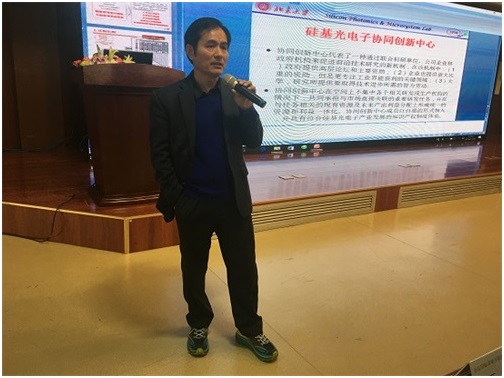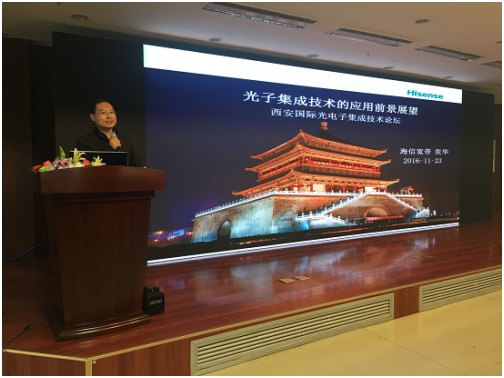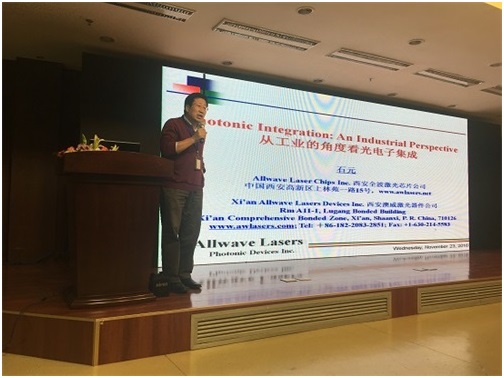Nov. 23, 2016, CFOL. The “Xi’an International Forum on Optoelectronic Integration Technology” sponsored by XIOPM, CAS, the Administration Committee of Xi’an Hi-tech Industries Development Zone and IMEC (China), undertaken by Shaanxi Research Institute of Leading Technology for OEIC and co-sponsored by CFOL, a famous media in optical communication industry, was solemnly held in XIOPM Zutong Building. The sponsors hereby express their sincere thanks to Wujiang Haituo Instrument Equipment Co., Ltd, Shehzhen Xingqihang Automatic Equipment Co., Ltd. and Tektronix (China) Co., Ltd. for their great supports for the Forum.
The Forum centers on “next-generation optoelectronic integration technology” and proceeds from multiple backgrounds of optoelectronic integration technologies, to jointly explore industrial opportunities for next-generation optoelectronic integration technology. It brought together top-notch domestic academic experts and representatives of enterprises in optoelectronic integration field and pioneers in global optoelectronic integration sector, attracted nearly 200 professional audiences from Beijing, Shenzhen, Shanghai, Suzhou, Fuzhou, Hangzhou, Xiamen and Xi’an,etc. for development opportunities in the field. The Forum was chaired by Cao Huitao, founding partner of CAS Star and president of Shaanxi Research Institute of Leading Technology for OEIC.
Zhao Wei, director of XIOPM, first addressed the Forum. He expressed that: XIOPM explores deep integration between sci-tech and market, service and finance and between institute and society. It has founded “Xike Angle” Fund, established “CAS Star” hard sci-tech enterprise incubator, proposed the concept of “hard science and technology”, created the first domestic professional Maker space for optoelectronic integration, and made a lot of efforts in transformation of sci-tech achievements; it is hoped that the Forum can help the circle jointly explore the latest achievements of China in optical communication industry, concentrate on making breakthrough in cutting-edge core technologies and promote rapid development of China’s optoelectronic integration industry. Later, Yang Hua, director of the Innovative Development Section, Xi'an Hi-tech Industries Development Zone and Ding Huiwen, president of IMEC China expressed their congratulations to the Forum. The distinguished guests making speeches unanimously thought that China’s optical communication industry is experiencing a new opportunity, and optoelectronic integration technology will become an important turning point in China’s optical communication industry upgrade.
In addressing the Forum, Wang Fei, vice director of Xixian New Area, Shaanxi expressed that as a national base for double-creation demonstration in the first batch, Xixian New Area has constructed some professional parks and service platforms such as Western China Innovation Port, China-Russia Silk Road Innovation Park, New Silk Road Digital Cultural Double-Creation Base, Big Data Startup Incubator and Cloud Platform for Digital Manufacturing, etc., and attracted a big batch of startup companies, investment companies, financial institutions, startup mentors and service institutions to develop there. A batch of quality projects have emerged out of obscurity. The New Area welcomes more hard sci-tech enterprises to approach to, understand and station at Xixian, to provide the most powerful supports for transformation and upgrade of China’s economy.
In his speech, Zhang Chengliang, vice director of China Telecom Beijing Research Institute expressed that: passive PIC technology has become mature and extensive commercial use has been realized. Silicon-base CMOS process has advantages in maturity, availability and low cost, but hybrid integration plus advanced assembly technology is really dominant due to material and process differences.
Professor Zhou Zhiping from Peking University boasts more than 20 years of experiences in research of silicon-photonics industrialization. He suggested that high-capacity data center needs high-speed data center, and long-distance transmission needs high-performance optical solutions. The higher the data transmission capacity, the better the ability to display advantageous performance of silicon-base optoelectronic technology will be. All of them are main driving forces to boost commercialization of optoelectronic integration technology. Domestically, the ability to complete a sound silicon-base optoelectronic R&D platform is one of key factors for silicon-base optoelectronic commercialization. It is expected that Shaanxi Research Institute of Leading Technology for OEIC can also build such a platform.
Later, experts from IMEC, Xi’an QXP Technologies Inc., Hisence Broadband, LaXense and Xi’an Full-wave Laser, etc. presented their forward-looking viewpoints about next-generation optoelectronic integration technology (including PLC, PIC, InP, silicon-base photoelectronics and hybrid integration,etc.) from angles of system integrator, application of optoelectronic integration, optical module, OEIC manufacturers, and new chip design enterprises, respectively.
To the end, Mi Lei, founding partner of CAS Star and executive director of Shaanxi Research Institute of Leading Technology for OEIC, Cheng Dong, president of Xi’an QXP Technologies, Doctor Li Dan from Xi'an Jiaotong University, Ding Huiwen, general manager of IMEC China, and Ke Maolong from Xi’an Full-wave Laser carried out deep discussions about “China’s opportunities and challenges in next-generation optoelectronic integration.”
The distinguished guests thought that, as the network requires smaller and smaller optical component assembly size but higher and higher performance, integrated optoelectronic components will be the road to success. If integrated optoelectronic components can be produced in batch, relevant equipment and the whole optical network’s cost and power consumption will be lowered. Progress of optoelectronic integration technology will deeply change the development pattern of optoelectronic industry in China and the old path relying on labor cost and price war, drive upgrade of optoelectronic industry and lift competitiveness of enterprises. At present, China’s next-generation optoelectronic integration technology is in the achievement transformation period from research to industrialization. Domestic optical component enterprises must take the strategic opportunity period to step on the road of virtuous development.

Zhang Chengliang, Vice Director of China Telecom Beijing Research Institute

Liu Lei, Senior Engineer of Huawei Fixed Network

Professor Zhou Zhiping with Peking University

Doctor Zhang Hua of Hisence Broadband

IMEC Kenneth Francken

Doctor Shi Yuan, CEO of Xi’an Full-wave Laser Chip Technology Co., Ltd.
Source linkage: http://www.c-fol.net/news/content/7/201611/20161123171933.html


